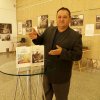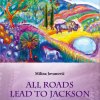Serbs in The United States and Canada
A Comprehensive Bibliography
Download PDF (3.6 MB)
Source:
© University of Minnesota, Immigration History Research Center
Second Edition
Revised and Enlarged
Compiled by
Robert P. Gakovich and Milan M. Radovich
Edited by
Judith Rosenblatt
Foreword to the Second Edition by
Dr. Vasa D. Mihailovich
University of Minnesota
Immigration History Research Center
St. Paul, Minnesota
1992
More from University of Minnesota, Immigration History Research Center:




